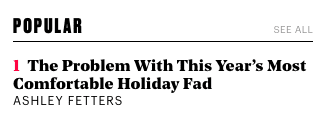So Woke You Can’t Sleep

Weighted blankets are blankets that have had small weights sewn into them, in an evenly distributed pattern. The goal is to put gentle physical pressure on the sleeping person. People who have sensory processing disorder — which includes many people on the autism spectrum — have found weighted blankets to be a tremendous help to calm them down and get them to sleep.
Ashley Fetters, who is not on the spectrum, writes:
I first encountered a weighted blanket out in the world sometime around 2011. A close friend of mine in college got one as a gift from her boyfriend—still, in my opinion, the greatest boyfriend gift I have ever witnessed—and soon all of our friends had tried it out. We were dazzled. What was this heavenly object, and how did being under it make us feel so sleepy, so fast?
I know the feeling. Earlier this year, I was overnighting at the home of friends in New Orleans. They had a weighted blanket. I tried it out. I slept so soundly! It was really amazing. I ordered a weighted blanket for myself, and followed the manufacturers advice to get one pound of weight for every 10 pounds of your body weight. It turned out that the blanket felt too heavy for me. I gave it to my older son, who has significant sensory issues. He’s a tall, broad-shouldered guy, heavier than I am, so this blanket was actually underweight for him. But it was perfect; he has found that it helps him a lot.
Anyway, most normal people, having discovered that the weighted blanket created to help autistic and other sensory-challenged people helps them too, would have been thrilled by this finding. Not Ashley Fetters:
Finally, in the late months of 2016, at the low point of a bout of wintertime loneliness, I decided to buy my own from the company my friend had recommended—SensaCalm. But when I looked at the website and read the glowing testimonials from parents of kids with autism-spectrum disorders, I got a weird feeling. I don’t have autism or a sensory disorder. This product was not marketed to me—and if I were to buy one of these blankets and then inevitably preach the gospel of weighted blankets to my non-special-needs friends, would we be hijacking their purpose? Worse, would our custom-blanket orders knock theirs further down the list and make their wait time longer?
She worried about … cultural appropriation? Millennials, man.
It was genuinely kind of Fetters to worry that people who direly needed these blankets would be deprived of them because people for whom they were a luxury good ordered them first. But as she notes in her piece, the boom in weighted blankets has helped many small artisans and business people who make them. It has also hurt others, as Fetters writes, alluding to a bigger company, Gravity Blanket, having hoovered up sales with its TV ad campaign.
But wait a minute: it’s not like weighted blankets are a limited resource. Nobody hacks them out of the earth from blanket mines. The more non-special-needs people who desire weighted blankets, the more weighted-blanket manufacturers there will be to cater to that market. Why doesn’t Fetters simply order her weighted blanket from a mom-and-pop manufacturer? Isn’t that a win-win? Besides which, Fetters may not be officially diagnosed as a special-needs person, but if the weighted blanket genuinely helped her to sleep better, maybe her senses are mildly disordered. If your life is improved by a benign tool like a weighted blanket, why do you feel that you have to justify desiring that tool?
Am I missing something, or is this what the culture of wokeness does to people? Notice the headline some editor at The Atlantic gave the piece (which is, as of this writing, the most popular piece on the site). It accurately sums up the meaning of the essay, but observe how the magazine problematizes something that is not actually a problem, except to woke neurotics:

Read the whole thing. There’s nothing harmful or malicious here; it’s just really odd, in a way that’s typical of our time. Can’t be at ease with your Halloween costume. Can’t be at ease with the music you listen to. Can’t even sleep, you’re so woke.

Subscribe for as little as $5/mo to start commenting on Rod’s blog.